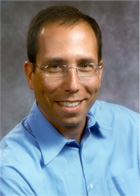
By Andrew Cohen
Leading Berkeley Law’s Center for the Study of Law and Society (CSLS) brings a weighty responsibility to new director Jonathan Simon ’87. After a long affiliation with CSLS as a Berkeley Law J.D. student, Ph.D. student, and professor, Simon is champing at the bit to expand its already broad influence.
“CSLS is a well-established leader in socio-legal study and methodology, and I’m eager to continue that momentum,” said Simon, who was closely involved with the center while chairing the law school’s Jurisprudence and Social Policy (JSP) Program. “There was no research hub like it when CSLS it launched in 1961, and there was no law school Ph.D. degree when JSP launched in 1978. They’re both pioneering programs whose scholars have collaborated for years.”
Simon inherits what former Law and Society Association (LSA) president and University of Wisconsin professor Howard Erlanger has called “without a doubt, the premier law and society research center in the world.” Like Erlanger, Stanford professor Lawrence Friedman—another former LSA president—heaped praise on CSLS during its 50th anniversary conference in 2011. Friedman described it as “a magnet for scholars all over the world” whose “international influence is incalculable.”
Simon champions the center’s longstanding push to challenge conventional legal and policy wisdom, and to reframe legal decision-making and discourse. He created the weekly Visiting Scholar Summer Speaker Series, and is working to make the CSLS website a go-to portal for the socio-legal field.
“This is an optimal time to maximize our impact,” Simon said. “Be it in social policy, criminal justice, or the legal profession as a whole, we’re in a moment of significant transition. CSLS will help define the roles lawyers can play in a host of changing areas, many of which have been largely stuck in place for the last 40 years. We’re positioned to present a clear empirical picture of the field and the skills that are valuable to it.”
Fueled largely by CSLS and the JSP Program, Berkeley Law has long valued an interdisciplinary approach to legal education. That approach is critical, Simon believes, if legal education hopes to remain pragmatic for modern-day legal practice.
“Law has historically been viewed as different from the other partners in interdisciplinary endeavors like Legal Realism or the Law & Society movement, but we’re at a time where human rights, behavioral psychology, and the humanities are at the forefront of many legal issues,” Simon said. “We can play a special role in strengthening existing connections and forging new ones, especially now when enthusiasm for our field is expanding.”
A leading authority on criminal law, Simon also wants CSLS to guide state policy development as California grapples with badly overcrowded prisons. He sees a strong link between the 1976 closure of UC Berkeley’s School of Criminology and a sharp rise in punitive—and ineffective—criminal justice measures. “We lost a valuable source of scholarship and insight that could have counteracted some of California’s misguided policies over the past few decades,” he said.
But stakeholders are beginning to heed consistent data showing that stratospheric incarceration rates have made society poorer, not safer. CSLS is poised to help policymakers navigate the road ahead.
“California is now undergoing the biggest free-form innovation in criminal justice history with 58 counties reinventing what we do with non-violent felons,” Simon said. “The center can use its research and analysis capabilities to help these counties develop sound policies.”